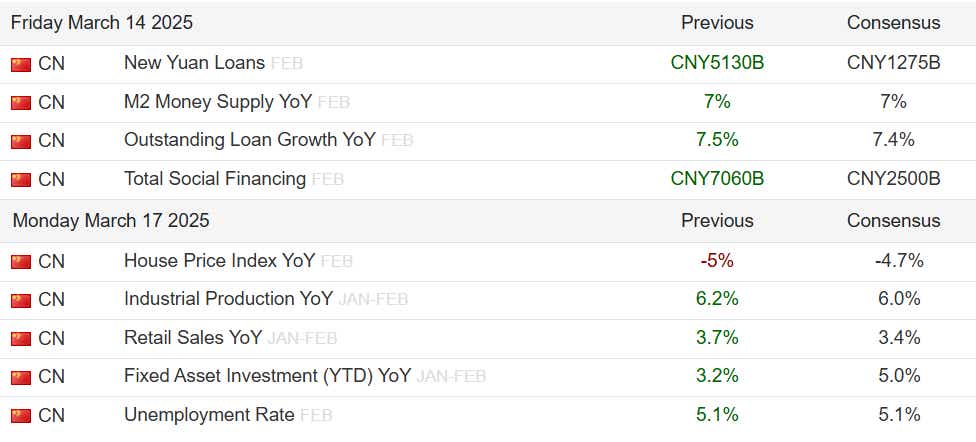China's Stock Market May Be Next to Fall as Beijing Disappoints on Stimulus

China's Stock Market May Be Next to Fall as Beijing Disappoints on Stimulus
By:Ilya Spivak
The markets think China has failed to promise enough stimulus to revive the economy
- China’s National People's Congress (NPC) promises stimulus to boost growth.
- The markets seem disappointed with the fiscal lift implied in new policy plans.
- Incoming lending and economic activity data may amplify investors’ worries.
The markets looked on with anticipation as China’s leadership gathered for the National People's Congress (NPC), an annual conclave of the country’s parliament. The inner core of officials steering policy – in current practice, President Xi Jinping and a small group of confidants – unveil their plans for the coming year, and they are formally endorsed.
China’s economy has been mired in a deflationary slump for seven consecutive quarters, reflecting near-absent demand growth. Business and consumer sentiment is yet to recover from the COVID-19 pandemic. Capital is flowing out of the country, and a vast array of efforts to lower interest rates and spur activity have seemed ineffective.
Is China ready to be bold about rebooting the economy?
Traders have long hoped that Beijing will embrace a big Western-style dose of fiscal largesse, spending public money to force demand through the economy and kickstart activity. Whispers about such an effort drove Chinese stocks sharply higher in September, but the rally hit a wall as officials opted to continue tinkering at the margins.
.png?format=pjpg&auto=webp&quality=50&width=1920&disable=upscale)
The NPC was to be the venue where the ruling class would finally signal that it is ready to be bold. The official deficit target was raised from 3% to 4% of gross domestic product (GDP), as widely expected. Target inflation was lowered to 2%, a tacit admission of the ongoing deflationary struggle. The growth target was kept unchanged at “around 5%”.
Beyond the headline deficit increase – which should add about 1.6 trillion yuan in spending – the government will boost issuance of local “special-purpose” bonds from 3.9 to 4.4 trillion yuan. This is for building infrastructure, purchasing idle land and housing, and paying contractors.
Finally, the central government itself will sell 1.8 trillion yuan more in ultra-long “special” bonds. This will be spent on a slew of various projects, including efforts to boost national security and recapitalize the banks. The Economist explains that all in, this will raise the deficit by less than 2% of GDP, an insufficient effort to revive momentum.
Do the markets believe stimulus in China will succeed?
China’s benchmark CSI 300 stock index tracking the top listings in Shanghai and Shenzhen was barely changed in the NPC’s wake, with prices pinned in the middle of the same choppy range that has contained them since late October 2024. Hong Kong’s recently outperforming Hang Seng Index (HSI) has likewise traded sideways.

This lackluster reception seems to speak to the markets’ disappointment with Beijing’s commitment. Incoming economic data may sharpen investors’ displeasure. Analysts expect a sharp slowdown in loans growth alongside weaker readings on retail sales and industrial production. House prices are seen falling for the 20th month straight.
The standstill in mainland stocks since beginning of the year has compared favorably with the selloff on Wall Street. The ETF tracking onshore equities (ASHR) is up 5.1% since the beginning of the year, while the S&P 500 is down 4.1%. As confidence in China’s fiscal efforts wanes, its markets may have room to catch up downward.
Ilya Spivak, tastylive head of global macro, has 15 years of experience in trading strategy, and he specializes in identifying thematic moves in currencies, commodities, interest rates and equities. He hosts Macro Money and co-hosts Overtime, Monday-Thursday. @Ilyaspivak
For live daily programming, market news and commentary, visit tastylive or the YouTube channels tastylive (for options traders), and tastyliveTrending for stocks, futures, forex & macro.
Trade with a better broker, open a tastytrade account today. tastylive, Inc. and tastytrade, Inc. are separate but affiliated companies.
Options involve risk and are not suitable for all investors. Please read Characteristics and Risks of Standardized Options before deciding to invest in options.
tastylive content is created, produced, and provided solely by tastylive, Inc. (“tastylive”) and is for informational and educational purposes only. It is not, nor is it intended to be, trading or investment advice or a recommendation that any security, futures contract, digital asset, other product, transaction, or investment strategy is suitable for any person. Trading securities, futures products, and digital assets involve risk and may result in a loss greater than the original amount invested. tastylive, through its content, financial programming or otherwise, does not provide investment or financial advice or make investment recommendations. Investment information provided may not be appropriate for all investors and is provided without respect to individual investor financial sophistication, financial situation, investing time horizon or risk tolerance. tastylive is not in the business of transacting securities trades, nor does it direct client commodity accounts or give commodity trading advice tailored to any particular client’s situation or investment objectives. Supporting documentation for any claims (including claims made on behalf of options programs), comparisons, statistics, or other technical data, if applicable, will be supplied upon request. tastylive is not a licensed financial adviser, registered investment adviser, or a registered broker-dealer. Options, futures, and futures options are not suitable for all investors. Prior to trading securities, options, futures, or futures options, please read the applicable risk disclosures, including, but not limited to, the Characteristics and Risks of Standardized Options Disclosure and the Futures and Exchange-Traded Options Risk Disclosure found on tastytrade.com/disclosures.
tastytrade, Inc. ("tastytrade”) is a registered broker-dealer and member of FINRA, NFA, and SIPC. tastytrade was previously known as tastyworks, Inc. (“tastyworks”). tastytrade offers self-directed brokerage accounts to its customers. tastytrade does not give financial or trading advice, nor does it make investment recommendations. You alone are responsible for making your investment and trading decisions and for evaluating the merits and risks associated with the use of tastytrade’s systems, services or products. tastytrade is a wholly-owned subsidiary of tastylive, Inc.
tastytrade has entered into a Marketing Agreement with tastylive (“Marketing Agent”) whereby tastytrade pays compensation to Marketing Agent to recommend tastytrade’s brokerage services. The existence of this Marketing Agreement should not be deemed as an endorsement or recommendation of Marketing Agent by tastytrade. tastytrade and Marketing Agent are separate entities with their own products and services. tastylive is the parent company of tastytrade.
tastyfx, LLC (“tastyfx”) is a Commodity Futures Trading Commission (“CFTC”) registered Retail Foreign Exchange Dealer (RFED) and Introducing Broker (IB) and Forex Dealer Member (FDM) of the National Futures Association (“NFA”) (NFA ID 0509630). Leveraged trading in foreign currency or off-exchange products on margin carries significant risk and may not be suitable for all investors. We advise you to carefully consider whether trading is appropriate for you based on your personal circumstances as you may lose more than you invest.
tastycrypto is provided solely by tasty Software Solutions, LLC. tasty Software Solutions, LLC is a separate but affiliate company of tastylive, Inc. Neither tastylive nor any of its affiliates are responsible for the products or services provided by tasty Software Solutions, LLC. Cryptocurrency trading is not suitable for all investors due to the number of risks involved. The value of any cryptocurrency, including digital assets pegged to fiat currency, commodities, or any other asset, may go to zero.
© copyright 2013 - 2026 tastylive, Inc. All Rights Reserved. Applicable portions of the Terms of Use on tastylive.com apply. Reproduction, adaptation, distribution, public display, exhibition for profit, or storage in any electronic storage media in whole or in part is prohibited under penalty of law, provided that you may download tastylive’s podcasts as necessary to view for personal use. tastylive was previously known as tastytrade, Inc. tastylive is a trademark/servicemark owned by tastylive, Inc.
Your privacy choices